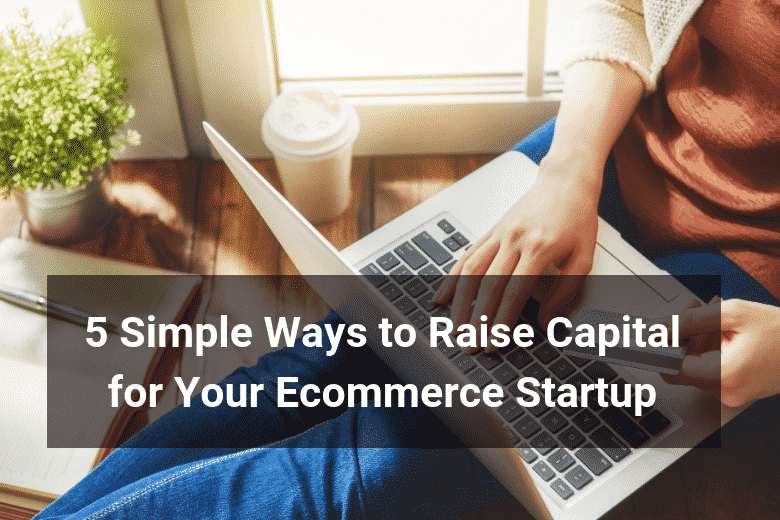There are a lot of ways to raise capital for your ecommerce startup. How you go about it mainly revolves around what you’re comfortable with and what you’re willing to risk. That said, some options are better than others.
Here are our top five ways to raise money for an ecommerce startup business.
Option 1: Don’t Be Afraid to Take Pre-orders
You might be afraid to start selling a product before your startup has fully started up. Don’t be. Just be honest with your customers by saying what they’re paying for a is a pre-order and that they won’t get their product until you’re ready. As long as you are upfront about this, it’s not disingenuous. If you feel it is, that says more about your belief in yourself and your business than it does anything else.
In addition to getting capital for your ecommerce startup, pre-orders will also give you an idea of the market. If you can’t get anyone to respond to pre-orders, it doesn’t necessarily mean you don’t have a winner, but it does suggest there is a problem somewhere. Maybe it’s the price, the packaging, or even your site’s layout. Maybe customers don’t even see how to buy what you’re selling. Regardless, there’s a problem somewhere.
Pre-orders can also help you plan production. If you get a lot of orders, you can start thinking about how to manufacture those orders. Do you do everything in the US? Should you consider going overseas? Pre-orders can help you plan a lot of logistics.
Option 2: Speak to a Bank About Taking Out a Small Business Loan
Few people ever get a venture capital investment. Most startup ecommerce businesses get started by taking out a small business loan.
It’s actually a good option and isn’t as risky as you would think.
It’s possible to get as much as $150,000 with a small business loan, which is a lot of money for an ecommerce business that doesn’t have as much overhead as brick and mortar shops. Even better, the process is fast. It’s possible to take out a large small business loan and close in as little as three weeks (or even less).
Another loan option is an SBA loan. Small business loans are a type of conventional loan, whereas an SBA loan is insured and guaranteed by the U.S. government. They’re better for startup ecommerce businesses because they typically have low interest rates, high loan amounts, as well as longer repayment terms (and longer repayment terms mean lower monthly payments, which is essential if you’re low on capital in the beginning). They also don’t come with any balloon payments, either. Everything is predictable and manageable. You may make payments for a longer amount of time, but it’s worth it in the beginning while you and your business are getting settled.
Option 3: Ask Friends and Family
If you’re afraid to do this, that’s reasonable, but ask yourself this: Is it partly because you believe you might fail? If it is, then maybe your intuition is telling you that you need to rework some parts of your business plan. Maybe there’s something that needs a bit more time to be developed.
When you’re 100% ready, and you believe that your ecommerce business is going to be successful, you won’t be afraid to ask anyone for money.
If you’re asking a lot of friends that are scattered across the world, make a Youtube video explaining what your business is and why you believe it’s going to be successful. Show them proof of concept as much as possible, as well as any other kind of data that you can to explain your case (such as survey results, site traffic, email lists, etc.).
We would even go so far as to suggest that you not bcc anyone. Bcc’ing people suggests a lack of intimacy or friendship. Let everyone see who you’re emailing. It will create a tribe mentality, and people will be more likely to help you if they believe they are a part of that tribe.
Option 4: Cash Out Your 401K
Dipping into your retirement savings may seem like a risk, but so too is watching an opportunity roll by. If you cash out your 401K you can do what is known as a ROBS (otherwise known as a rollover business startup). Doing this will allow you to get your money penalty-free.
Of course, you’ll definitely want to pay yourself back as quickly as possible. Retirement is coming, and it always comes sooner than you think! But retirement is more fun if you’ve been financially successful. Many financial advisers would advise against cashing out your 401K, but without risk, there’s no reward. ‘
Note: To cash out a 401K, contact your employer directly. He or she will connect with whoever is in charge of human resources. Tell them what you want to do, and you’ll be given the necessary forms to fill out. From there, you’ll be able to have the money sent to where you want.
Option 5: Crowdfund
There are a lot of crowdfunding sites out there right now. Popular ones include GoFundMe, Kickstarter, StartEngine, and Indiegogo.
Crowdfund sites, in case you’re new to the concept, are websites that allow businesses, charities, and even individual people to ask for money from strangers. In exchange for their money, you can promise them some sort of reward or profit. StartEngine, for example, trades money for equity, meaning when the person invests in your ecommerce startup business, he or she is buying a portion of your business.
You don’t have to sell off equity when you crowdfund. It’s up to you what you give your investors in exchange.
Many startup ecommerce businesses have been wildly successful with crowdfunding. If done right, crowdfunding can also be used as a proof of concept, which you can use when speaking with potential venture capitalists.
Ready to start shipping globally?
Floship is an ecommerce order fulfillment provider located in Hong Kong. Shipping through and from Hong Kong makes a lot of sense. It is close to your manufacturer, lead times are shorter, Hong Kong is renowned for being tax-free and with the ongoing trade wars between the USA and China, Hong Kong also is an affordable alternative. Instead of paying high tariffs on importing goods into the United States, ship through Hong Kong instead. Contact us to find out more.
Author
Luke Loftin is a blog writer and an award-winning indie filmmaker. When he isn’t writing about himself, he specializes in finance and health, blogging about all sorts of topics including credit cards, personal loans, bank accounts, and the digestive system. He currently writes for LeadsMarket among other sites, and his articles are scattered all across the information superhighway. You can find him on LinkedIn.

Ready To Upgrade Your Logistic Solution?
Speak to Floship ecommerce logistic consultant about improving your global support chain today





